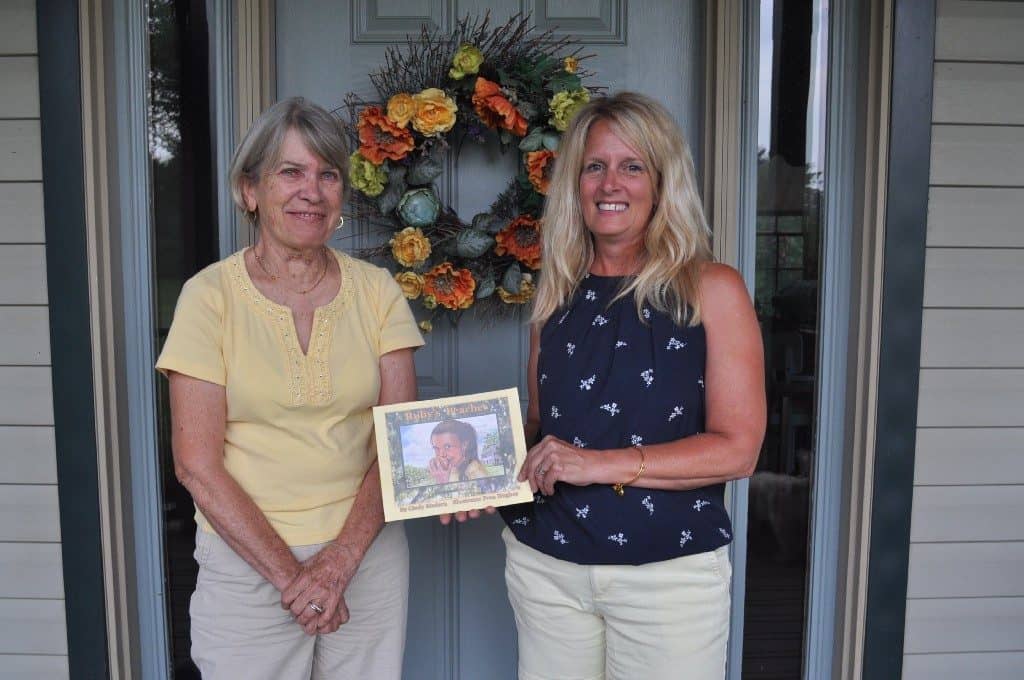
Author Cindy Madara and Illustrator Fran Hughes dedicate children’s book to local farmers, demonstrating the historical beauty of peach orchards

Resident Cindy Madara remembers driving around Richwood and Mullica Hill years ago with roads full of orchards. In the spring, she said, it would be like driving through a pink cloud when the rows and rows of peach trees would begin to bloom. Having spent many years of her life working or living on a farm, the simple life she enjoyed so much inspired her to share the beauty of her hometown in a children’s book, “Ruby’s Peaches.”
Madara tells the story of a young girl named Ruby living on a farm with her grandfather Poppy, transitioning through the seasons of harvesting peaches while she learns to read.
“I wanted to tell the story of what it was like around here back then,” Madara said of the area in the 1970s and 80s. “The story tells what it was like in a simpler time.”

In high school, Madara sorted peaches in the packinghouse of Damminger Farms on Route 322. She and the migrant workers would call the owner Bud Damminger, Sr. “Poppy,” whose love of farming inspired her to write the story, she wrote in the dedication of the book.
“I was also very close to my grandfather growing up, even though he wasn’t a farmer, so I think that loving relationship — the play between Ruby and her grandfather — is in the story as well,” Madara said.
Throughout the story, Ruby and her grandfather have a gentle back and forth dialogue — Ruby asking each season if the peach trees are ready, with Poppy responding with a wink or a smile saying, “It’s almost time.” While Ruby waits for the peaches, she practices her spelling and reading skills. Ruby asks her grandfather, how do the trees know when to bloom, how did the men know it was time to “tap, tap,” the small peach nuggets off the limbs, or how did you know the peaches were ready to be made into cider? Poppy responds with nature — the sun, wind and bees let him know.
“There are two different kinds of growth,” illustrator Fran Hughes said. “Ruby gained an appreciation for what was surrounding her and the gentle way her grandfather explained it, bringing the nature into it — it’s not too scientific for kids — and at the end, her triumph is she can now read the label on the cider bottle. It’s a nice way to pull everything together.”
Hughes said she offered to illustrate the book once she read the story and fell in love with it.
“The story itself, even though it’s a quiet story, it has such a gentle exchange between a child and her grandfather,” Hughes said. “It’s just lovely.”
Having grown up in Northeast Philadelphia, Hughes said moving to the Mullica Hill area was paradise, and she wanted to reflect that beauty in the drawings she created. This was the first time Hughes had used a computer as her medium, she said, and in some ways it was much easier. If she made a mistake, it was a click of a button rather than starting new, but on the other hand, she spent hours upon hours manipulating her drawings and images.





Many of the farm landscapes, houses and people in the illustrations came from actual photographs or properties local to the Mullica Hill and Richwood area. For example, Hughes said, the house in the story is a farm across the street from her own home, while her husband Jim and her sister-in-law’s granddaughter modeled for the illustrations of Poppy and Ruby. Many images of the men working on the farm in the story were drawn from images taken by Madara during her time studying migrant workers for her graduate school thesis in Puerto Rico, or photographs of the men who worked on the farms she’s lived on. Drawings of peach crates and boxes found in the story say “Garden State Fruit Farm,” the original name of Madara’s husband’s family farm, now known as Madara Farm.
“I wanted the book to be a dedication to all of the local farms here,” Madara said. “It was a great place to grow up and I wanted to represent what that was like here.”
Madara, a member of the Mullica Hill Writers Society, said writing has always been a dream of hers but seemed to be pushed to the back burner most of her life. She said she finally began to write the story 10 years ago, and started working with Hughes almost five years ago.
Through years of contacting agents and publishers, Madara and Hughes made the decision to keep the story in more local markets for now, self-publishing the book through the online site Bookbaby, where it was copyrighted and given an ISBN. Madara said this summer was a soft release, with the goal of having the book out in time for peach season.
“We’ve gotten a lot of good reaction because people remember what it was like and how beautiful it was; we’re trying to pass that on,” Madara said. “I’ve had teachers interested for lessons, such as science. Kids don’t really know too much anymore about what it’s like on the farm. There are still some around, but not as many as there used to be.”
Hughes said local families have told her the book is creating a legacy to pass on to their children and grandchildren, giving the farmers an opportunity to share their history and where they came from.
The paperback children’s book can be purchased online through Bookbaby, at www.store.bookbaby.com/book/Rubys-Peaches2, or www.amazon.com for $15.99, or locally at Amazing Grace in Mullica Hill. For more information, visit Ruby’s Peaches on Facebook, or email [email protected].









